We continue our look at David Lynch’s Dune, comparing the film’s plot with the book, and try to justify some of the film’s questionable narrative decisions.
Frank Herbert’s classic science fiction novel Dune has been notoriously difficult to translate to the big screen. When David Lynch agreed to direct a feature film adaptation in the early 1980’s, he faced an uphill battle to say the least. In addition to the complexities associated with the source material, the film was given a large budget in order to try to be competitive with Star Wars in the blockbuster sci-fi realm. Suffice to say, expectations were high.
In the face of such adversity, including the always detrimental impact of unwelcome studio and financier intervention, 1984’s Dune did not have a satisfactory release into theaters. The film was a box-office disaster and was utterly crushed by critics. And it wasn’t just a matter of the film being too far ahead of its time for audiences to properly enjoy it, the film was bad in almost all regards. Unsurprisingly, Lynch didn’t want anything to do with the film because he felt that the final version didn’t represent his vision.
But for everything that is wrong with Lynch’s Dune, it has grown a strong and dedicated following. These fans have embraced the blemishes of the film not as demerits, but as strengths. It is a film that is so wild and out of control you can’t help but be at least a little bit impressed by its ambition and uniqueness. Instead of dwelling over what it could have been, you just have to appreciate the untamed spectacle of what it is. What’s certain about 1984’s Dune is that you will never see another film like it.
And to prove to you just how such a troubled film could actually be considered enjoyable, Jordan and I decided to list 50 of the differences between the book and the movie and try our best to frame them with a positive spin. We put ourselves into the shoes of filmmakers who are trying to pitch this monstrosity to skeptical audiences who have better ways to spend 2 hours of their time. This should be interesting…
This is Part 2 of this article. For Part 1, click here!
(in attempted chronological order of the film…)
***NOTE – This article contains spoilers for David Lynch’s 1984 film, Dune, as well as Frank Herbert’s original novel. Although we don’t directly discuss the new 2021 Dune, some aspects of what we discuss may have correlation with the new film.**
- Why are all the Fremen in the movie pasty white people?
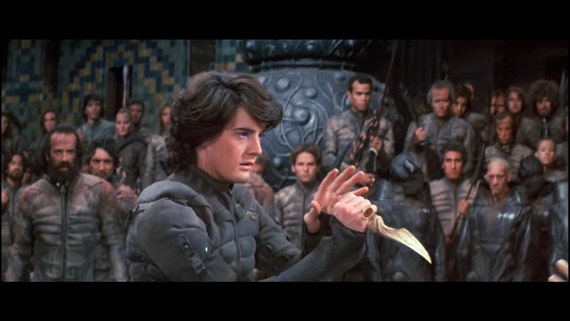
Garrett: They Fremen only come out at night. And they have spice sunscreen. But yeah, there are not excuses for the lack of non-white people in this movie.
Jordan: *Stares in Indigenous Person*
- The Fremen have full trust in Paul almost as soon as they meet him.
Context: In the book, the Fremen are skeptical about who Paul is supposed to be, but they are intrigued by Jessica and what she can teach them, so they decide not to kill Paul.
Garrett: Paul’s just so awesome that he doesn’t even have to do anything and people are willing to die for him.
Jordan: As we established, David Lynch didn’t have time to mess around, so he pushed through the story with all the subtlety of a steamroller. In terms of a “white savior” story that goes full hog on the superhuman angle, however, this fits in line with just about every other cliché and it’s easy enough to wave off.
- The Fremen randomly reveal that they have a reverend mother (surprise!), who is like a Bene Gesserit-lite, and she’s running out of reverend mother juice, so they need a new one.
Garrett: It’s a good thing they found Jessica when they did! But seriously this is something the film could have gone without, especially since the narrative goes away from exploring the Fremen’s fascination with the Bene Gesserit. But it was also a wasted opportunity to expand the Bene Gesserit as something beyond the nefarious “witch” role they were given.
Jordan: Yeah, if there’s one thing Lynch’s version of Dune does, is pretty much water down the importance/specialness of the Bene Gesserit. From turning their general powers/abilities into something that can be shot with a gun, to exchanges like this. Sure, the encounter with Reverend Mother Ramallo happens fairly quickly in the book as well, but the context is completely lost in this translation.
- Jessica volunteers to be the new Reverend Mother and has to drink the water of life, which is barely explained at all. It also isn’t really explained what happens to her, or why the water of life is so dangerous.
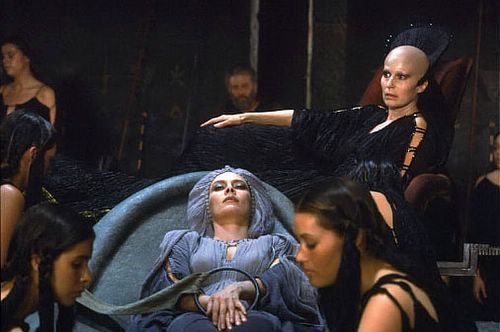
Garrett: It would have been very trippy if they could have physically depicted what happens to Jessica when she drinks the Water of Life. I wanted to see molecules being broken apart and reassembled by the body. But then again, that would have probably just made it even more confusing. So, in that regard, the simpler the better. Furthermore, they had to keep this in the film to explain why Paul takes the Water of Life in the later scene.
Jordan: This is actually something that I don’t think ever bothered me in the film. Hell, the explanation in the book itself is trippy and hard to explain (and somehow leads to massive orgys…). The movie does a decent job of conveying the danger in taking the Water of Life, and its importance, even though it keeps things “surface level.” For casual watchers, it definitely works.
- Speaking of the “Reverend Mother” it is never explained why she is important to the Fremen society. More importantly, the female characters in this film have almost nothing to do, which is in sharp contrast to the book where they are often powerful figures.
Garrett: While the film has its shortcomings when it comes to story, the even more unforgivable problem with it is how it treats people who aren’t white, straight, and men. As I have already noted, there are zero people of color in this film and the allusion to AIDS is unfortunate. However, one of the biggest strengths of Herbert’s Dune novels is how great the roles are for women. They are powerful and capable, and just as impactful on the story as the male characters. So, by making the women in this film caricatures, it really does them, and the audience a grave disservice.
Jordan: While the original novel features some “not great things” in general, Dune was incredibly progressive in terms of women characters. Truly, they were at the forefront of the story and served in such a way throughout the entire Saga. So yeah, it’s a bummer to see it dialed back entirely for this movie.
- Paul teaches the Fremen how to use the Weirding Module and in the process it is revealed that not only do the Fremen have access to advanced weapons already, but they have a random pyramid of perfectly sculpted rock which they let Paul destroy. Also, wasn’t Jessica supposed to teach them how to fight?
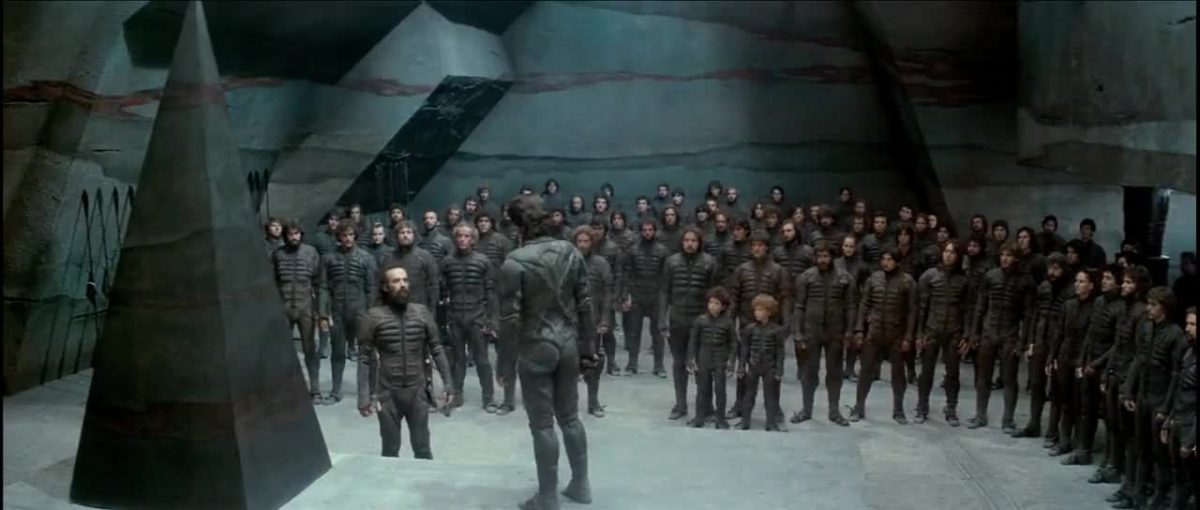
Garrett: The Fremen are just showing off their artistry and ingenuity. Paul asked for something to use for training and they went above and beyond. And Jessica has more important things to do now that she is the Reverend Mother.
Jordan: Considering we had a whole thing about how Dr. Yueh specifically destroyed the Weirding Modules for House Atreides to give Harkonnens the edge, it is strange how quickly the Fremen get their hands on a shitload of them. I mean, I suppose it could be a metaphor for their resourcefulness and ability to do so much unnoticed.
- The movie completely ignores the subplots inside Sietch Tabr. In fact, I don’t even think they mention the name.
Garrett: That just leaves more time for riding around the sand on the backs of giant sandworms, which is frankly much more memorable.
Jordan: The extended version of Dune covers quite a bit of the ins and outs of Sietch Tabr (though I don’t think it’s named there either). Even so, we get to see a little bit more of the every day life of the Fremen and what Paul is there to “save” them from.
- It’s not very clear how much time is passing.
Garrett: The spice must flow! So also Dune must flow! You just let it seep into your mind. The whole film is like a fever dream. Time is not important. Plus, the 80’s were the time of the montage. This is like the ultimate trippy, sci-fi/fantasy montage. Enjoy!
Jordan: To be fair, Dune itself seems to play fast and loose with the flow of time. True to old-school Science Fiction novels, rules are for chumps, even when made up within the story. That said, the events of David Lynch’s Dune could have all taken place within a week based on how it’s laid out.
- Chani and Paul fall in love right away. Who could have seen that happening?
Garrett: Chani is the girl of his dreams.
Jordan: I too, instantly fell for Kyle MacLachlan’s gorgeous locks…
- The Harkonnens aren’t very good at defending their spice harvesters. After it becomes pretty apparent what the Fremen are doing, they just keep leaving them undefended.
Garrett: The movie needs something to blow up, so…
Jordan: I think I mentioned this in the previous article, but one of the things Lynch’s Dune does pretty well, is make it more appealing to general audiences/Sci-Fi fans. Like all things in the 80s, action takes precedence over logic, so giving the Fremen plenty of things to blow up without blowback consequences is pretty par for the course.
- Lack of spice negatively impacts the Guild Navigators. But it is their servants who show up at the Emperor’s palace looking ill.
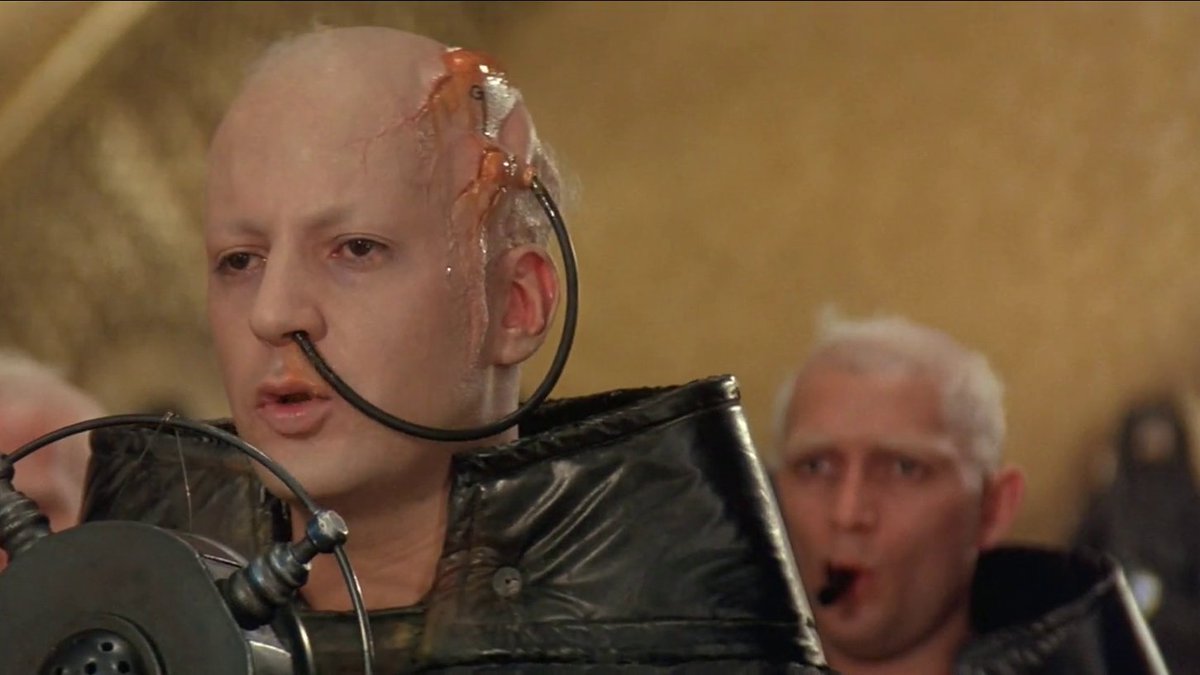
Garrett: I think it was a necessary compromise because it was too expensive to bring the Navigator into these scenes (and cumbersome). It just makes the first scene that much more special.
Jordan: They blew their Navigator budget at the beginning, so the best way to convey the affect on the Guild overall, is to focus on the servants at the end. Also, they’re ridiculously ugly and I could go without seeing them in another scene!
- If all the Weirding Modules were destroyed by Dr. Yueh, how are the Fremen able to produce thousands of them for their armies?
Garrett: The Fremen are more crafty than you might think…
Jordan:
- Patrick Stewart is back, where did he go in the first place? The last time we saw him he was fighting the Harkonnens alongside the family dog.
Garrett: They left Gurney’s fate uncertain so that they could bring him back later on, and focus on Paul. Like all the supporting characters in this film, he gets the short end of the stick. But he is Patrick Stewart so he makes the most of it. Also, he does manage to save the all-important dog, which will be featured later on.
Jordan: To be fair, Gurney’s fate is somewhat uncertain in the novel as well, but his role is greatly diminished here due to the skipping of the whole “Lady Jessica could be the traitor” subplot being absent. Gurney’s return in the novel serves more of a purpose as he still thinks Jessica is the traitor and tries to kill her, but without that…Well, he saved the dog.
- When Paul drinks the Water of Life he recovers very quickly, and not much else happens. In the book it is a weeks-long affair.
Garrett: This film characterizes Paul as essentially a superhero. Because of that, he can’t really show any weakness. He drinks the Water of Life and takes it like a man. Then he gets up, dusts himself off, and proceeds to take over the entire known universe.
Jordan: Compressing the story down into a single film really messes up the sense of time/scale. Even though there are some allusions to Paul’s ordeal taking longer (especially in the extended cut), it’s mostly over and done with in short order. After all, this gets us to the big worm-riding, gunslinging, finale that much quicker.
- Around this time Paul is also supposed to become a father, but that doesn’t happen in the film.
Garrett: But if you watch the background you will see two Fremen children in many of the shots, including the scene where Paul rides the worm, and then later in the final climax. In that final shot one of the kids is carrying Gurney’s Pug.
Jordan: Considering the film makes it seem like everything takes place within just a few weeks, I suppose cutting out the whole plot about Paul’s first child makes a lot of sense. Honestly, this cut never bugged me. While it diminishes the sense of time passing, Paul’s son in the novel is really only a device to fuel his desire for revenge. Since he’s already on a revenge quest, of sorts, the added justification feels unnecessary. I look at the kids at the end as a fun “Easter egg” for fans who read past the first book.
- The first time audiences see a person riding a worm is when it is Paul’s first attempt. There is no build-up, training, explanation, etc. to that moment whatsoever.
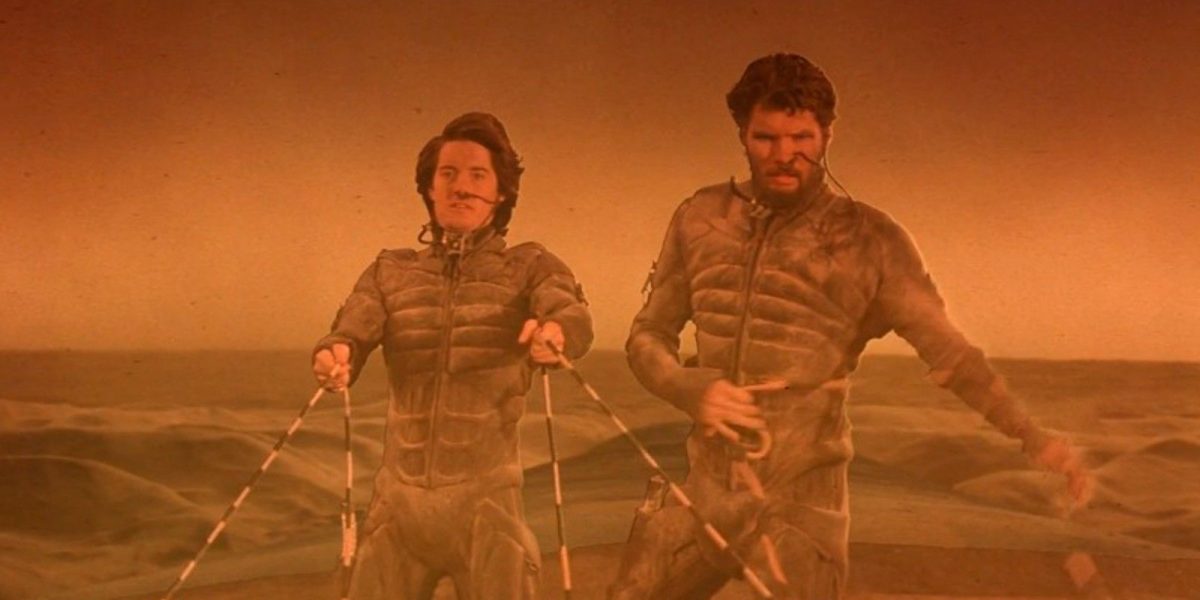
Garrett: Who cares. This is the moment where the soundtrack introduces the electric guitar. They could be watching paint dry and it would be epic. This is the zenith of the film.
Jordan: Exactly what Garrett says, who cares at this point. Seeing a giant worm in this context is cool no matter how much setup is (or isn’t) there. It still makes for an epic moment and gives just enough hints to make it clear this is a common practice among the Fremen.
- When the Fremen are trying to attract worms, they place all of their thumpers in the same spot. Wouldn’t they want to spread out? It’s not like all the worms are going to fit in one spot.
Garrett: To attract lots of sandworms I guess you need to increase the amplitude of the vibrations so that they can travel further. But at least it gives the sense of impending excitement, giving us expectations for something big.
Jordan: Oh it’s far too late to assign logic to the things going on in this movie. Once again, so many of the “big” moments in the movie are designed completely around the 80s action aesthetic. It’s strange, considering Lynch is so known for doing his own thing, how “mainstream” he goes with storytelling techniques in Dune.
- Randomly the Fremen not only have nukes, but also radiation suits. Do those fit over their stillsuits?
Garrett: Ah yes, the good ol’ atomics. Never mentioned until they were necessary to the plot. But if you want to have a futuristic sci-fi battle, you need to blow things up. That’s moviemaking 101. Although, the explosion doesn’t really feel like the explosion of an atomic weapon. That’s one area where the second part of the new film can certainly try to improve on this masterpiece.
Jordan: I know I keep mentioning it, but yeah, this is a thing the extended version covered a bit better. They explain the use of atomics on the shield wall, though there really is NO explanation on where they got the nukes. Between this and the Weirding Modules they all have, it seems like the Fremen had everything they needed to win this war a long time ago!
- The final battle is the most pointless battle ever made on film. The Emperor’s army is just shooting lasers at the worms, which won’t do anything, and the worms can just crush everything in their path. How do the Fremen get them to crush the right things, I thought only Paul can control them?
Context: In the book, the Fremen actually have an attack strategy.
Garrett: Paul is so awesome that he doesn’t just control one sand worm. He controls all of them, although this is never explained in the film. Also, since he can see into the future, he doesn’t need a battle plan. That would be a waste of his time. But it seems like the worms are doing all the heavy lifting. If this jihad is going to expand across the known universe, the Fremen are going to have to pull their own weight.
Jordan: When that heavy-hitting electronic score kicks in, and the worms are smashing enemies, it doesn’t matter that there’s no real plan. In many ways, this feels like the only way this battle COULD play out in the film. Since Herbert himself tended to shy away from action scenes (there’s the big planning part, then it skips the battle itself for the most part!) it does allow any filmmaker some freedom to show it how they want.
- “Bring in that floating fat man! The Baron!”
Garrett: It makes me laugh every time. It’s like the filmmakers thought we would forget who the Baron was. Granted A LOT of stuff happened in between this moment and when we last saw the Baron. It also speaks to how different the Baron is characterized in the film (as a maniacal hot-head) compared to the book (plotting and intense).
Jordan: The Baron is so very different in this movie than the novel, that I’m mostly glad we don’t see him nearly as much as you’d expect the main villain to pop up. As Garrett mentioned, he veers towards the cartoonish villain in the film, rather than the manipulative and super-smart tactician he really is. Having him be the butt of jokes/one-liners just hammers this home.
- Who brings (pyramid) drums to a knife fight?
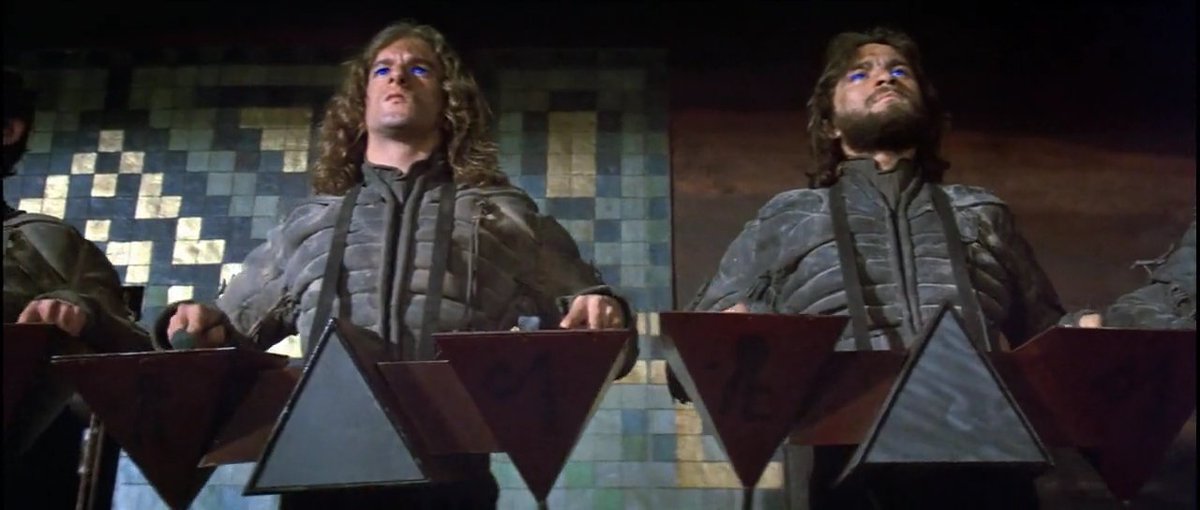
Garrett: Drums make things sound important. So when your supreme leader is about to have an unnecessary fight to the death, you sure as hell better mark the occasion by banging on some drums. Also, this helps wake up those in the audience who may have fallen asleep during the preceding snooze-inducing worm/laser battle.
Jordan: Every single time these drums come out, the only thing I can think about are the poor Fremen who had to CARRY these things on the worms during battle. While all their comrades are busy fighting the ultimate battle for control of the universe, they’re hanging in the back making sure the drums don’t get lost…
- Feyd-Rautha’s cheating ways aren’t foreshadowed in the film. In fact, Feyd doesn’t have a whole lot to do until the very end. It makes you wonder why they kept him in the film when they jettisoned so many other important subplots.
Garrett: My experience has been that Sting’s portrayal of Feyd is one of the things people remember best about this film. He made an impression, even without having much to do until the end. Also, everyone knows who Sting is, so you have to give him a moment to shine. He can’t just stand in the background the whole film.
Jordan: In many ways Feyd is setup to be the mirror of Paul, just raised under different circumstances. In this film, however, he’s an obstacle and serves as one final action sequence. After all, you don’t have a superhero origin story without them having some sort of one-on-one battle with the villain!
- What’s with the random rain at the end?

Context: In the novel, the Fremen are revealed to be working to slowly change the ecosystem of Arrakis over time. But it never actually rains on Arrakis.
Garrett: Arrakis is Planet Opposite. Instead of the sun coming out of the clouds to signal peace and happiness, the clouds obscure the sun and rain falls. Everybody’s happy. The most valuable resource on Arrakis is literally falling from the sky.
Jordan: If there’s one thing to be said about the film, it goes WHOLE HOG on the interpretation it chooses. It chose to present the story as a superhero origin, and at this point, the film almost HAS to end with some giant display of power in order to show the full transition Paul has made. It’s funny in that as many abilities as the movie seems to give Paul, it spends almost no time on the actual power he has in the book!
Despite the strangeness of the rain popping up magically, and the off-hand explanation from Alia, it serves as the perfect “Hollywood” ending. I mean, I think everyone knew a sequel wasn’t likely to happen, so might as well put a nice bow on things in the last shot!
- The ending voiceover proclaims that Paul will bring peace to the universe, but that is the exact opposite of what happens in the book.
Garrett: Nobody wants to have to sit through this movie only to find out that it all led to a brutally violent jihad. A happy ending makes it all worthwhile, right?
Jordan: Spoiler alert! Paul is not a “good guy.” In fact, he’s pretty horrible and ends up completely obliterating dozens of entire PLANETS. Sure, he’s doing what he has to do to ensure humanity survives into the future (and it ultimately haunts him), but there’s no true happy ending for the guy. In many ways it’s a bummer, and too much of a bummer to get into for the film’s finale.

